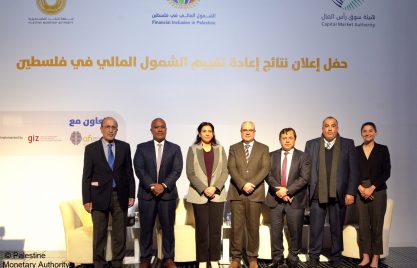The Palestine Monetary Authority (PMA) and the Palestine Capital Market Authority (PCMA) presented the results of the 2022 Financial Inclusion Diagnostic Report. The report aims at measuring financial inclusion developments since 2016 and the progress in the implementation of the National Financial Inclusion Strategy.
After 6 years, the PMA and the PCMA, conducted a second national financial inclusion demand-side survey with two objectives: To measure the financial inclusion developments since 2016 and to examine the progress in the implementation of the 2018-2025 National Financial Inclusion Strategy (NFIS). The conduction of the survey and analysis under the “Financial Inclusion Diagnostic Report” shall set the ground to review and update the strategy’s action plans with a particular emphasis on the improvement of women’s and digital financial inclusion.
During the results’ launching event, the governor of the PMA Dr. Feras Milhem highlighted the progress in terms of access to as well as use and quality of financial services. By reaching a financial inclusion level of 50.9% in 2022 compared to 36.4% in 2016, the in 2018 set goal to reach 50% by 2025 was over-achieved. Next to the financial inclusion level, the governor also brought attention to the increase in the level of financial literacy that went from 41.3% in 2016 to 53.3% in 2022. A remarkable development in the provision and use of digital financial services as well as its potential for financial inclusion was also recognized at the event. Developments include the introduction of e-wallets and other digital financial services such as electronic point of sales, online banking services and online bills payments, which are being used by 15.1% of the population.
Watch the most important results of the report here.

As reviewing financial inclusion strategies is crucial to identify gaps in its implementation, the report also underlines challenges hindering a further increase in the level of financial inclusion. Among the identified challenges, economic factors stood out next to an increase in the gender finance gap that rose from 21.8% in 2016 to 26.6% in 2022. In view of this, the chairman of the board of directors of the PCMA Dr. Nabeel Kassis pointed out to the journey that is still ahead and the need to revise relevant national policies and amend the NFIS action plans.
Mr. Eliki Boletawa, Director Policy Programs and Implementation at the Alliance for Financial Inclusion (AFI), underlined the importance of stakeholders’ collaboration to successfully drive efforts, particularly regarding the implementation of the newly developed roadmaps on women and digital financial inclusion. The event was concluded by a call for action and encouragement of support from all relevant ecosystem stakeholders that formed the audience of over 300 guests attending the event.
Click here for a summary of the Financial Inclusion Diagnostic Report, the Gender Roadmap and the Digital Financial Services Roadmap in English and Arabic.
By Sofia Bublatzky
URL links: This publication contains links to external websites. Responsibility for the content of the listed external sites always lies with their respective publishers.



